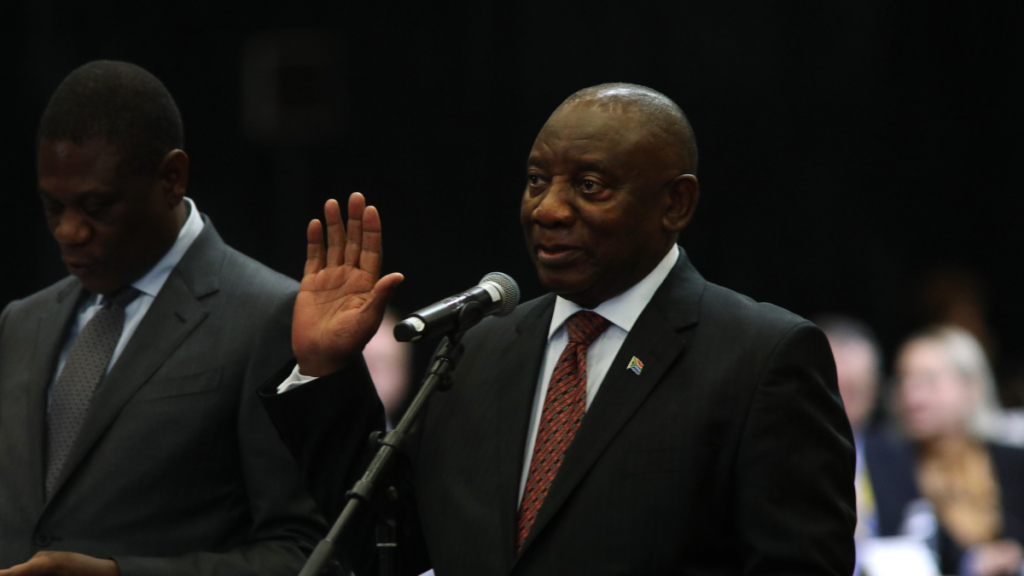South Africa’s political landscape gears up for a cabinet power struggle as President Cyril Ramaphosa readies for his new term amid a coalition government formation. With negotiations heating up over key ministerial positions, particularly in economic sectors, the alliance seeks to address pressing challenges like slow growth and high unemployment. Investors are eyeing policy continuity and potential reforms, anticipating significant economic implications under this diverse governing arrangement.
Sign up for your early morning brew of the BizNews Insider to keep you up to speed with the content that matters. The newsletter will land in your inbox at 5:30am weekdays. Register here.
By S’thembile Cele and Ntando Thukwana
(Bloomberg) —
South African political parties that last week agreed to form a governing alliance are limbering up for a tussle over cabinet positions, as President Cyril Ramaphosa prepares to be sworn in for a new term.
Senior leaders of Ramaphosa’s African National Congress met on Monday to prepare for formal talks on how key posts will be shared in the next administration. While five parties have signed up for the so-called government of national unity, the bulk of the negotiations on the portfolios will be between the ANC and the Democratic Alliance, which emerged as the second-largest party in last month’s elections.
The structure of the next cabinet will be closely watched by investors anticipating an acceleration of economic reforms under a more centrist-leaning government. The rand has strengthened almost 3% so far this month as bonds and stocks have rallied on optimism about pro-growth policy continuity.
“The new coalition government faces a myriad of economic challenges including sluggish growth, acute unemployment, and fiscal pressures,” HSBC Sub-Saharan Africa Economist David Faulkner said in a note. “We think the government of national unity opens the possibility for more growth-friendly structural reforms and prudent macroeconomic policy choices.”
The DA, a centrist party that espouses free-market principles, is eying key portfolios in the economic cluster in the new administration, though they will be opposed by the ANC, according to people familiar with the matter who asked not to be identified as they’re not authorized to comment. The economy cluster includes the trade and industry, public enterprises and finance ministries.
Inauguration Ceremony
Finance Minister Enoch Godongwana has been sworn in as a lawmaker, making him eligible for reappointment, though he said his future in the portfolio is the prerogative of Ramaphosa.
Asked on June 14 by Bloomberg if he expected to remain finance minister in the next cabinet, he said: “I can’t answer that question. The president will.”
The ANC is also unlikely to concede to any demands for positions in the security cluster, which includes the police and justice ministries, the people said. It also won’t agree to a DA proposal to issue cabinet posts proportional to parties’ performance in the election, they said.
Ramaphosa is scheduled to be sworn in at an inauguration ceremony on Wednesday. Bilateral meetings with party leaders will then begin in earnest with a view toward announcing a new cabinet in the coming days.
The president’s previous cabinet included 30 ministers and 36 deputy ministers. While he’s previously pledged to slim down the executive, that plan may be put on hold to accommodate new partners in the government, the people said.
The configuration of the new cabinet will likely “translate into broad policy continuity relative to the previous administration,” Goldman Sachs International Inc. Economist Andrew Matheny said. It will possibly come with “better implementation/execution, given that the ANC will be subject to more checks and balances and greater accountability being in a coalition,” he said.
Foreign Minister
Under South African law, Ramaphosa may appoint up to two people to cabinet who aren’t members of parliament. One of those positions is expected to go to International Relations and Cooperation Minister Naledi Pandor, the people said. Pandor spearheaded Ramaphosa’s foreign policy initiatives over the past six years, including the expansion of the BRICS economic bloc.
In addition to the DA, three other parties have signed a statement of intent to participate in the government of national unity, the ANC said in a statement on Monday. They are the Inkatha Freedom Party, the GOOD party, and the Patriotic Alliance.
The IFP may get a single cabinet post, while the smaller parties will be accommodated in various roles in parliamentary committees, the people said. The five parties that agreed to join the unity government account for 68% of the 400 seats in the National Assembly.
The unity government accord prioritizes the economy among its 11 focus areas for the incoming administration. It touts fixed capital investment, structural reforms and fiscal sustainability as key objectives to accelerating economic growth.
South Africa’s economy has expanded by less than 1% a year on average over the past decade — well below what’s needed to maintain living standards for the growing population.
Read also:
SA parliament to elect new president amid historic shifts in power
Ramaphosa calls for reforms as coalition deadline looms
SA’s unity government talks: Navigating contradictions for stability
© 2024 Bloomberg L.P.
>>> Read full article>>>
Copyright for syndicated content belongs to the linked Source : BizNews – https://www.biznews.com/sarenewal/2024/06/18/sa-braces-cabinet-battle
